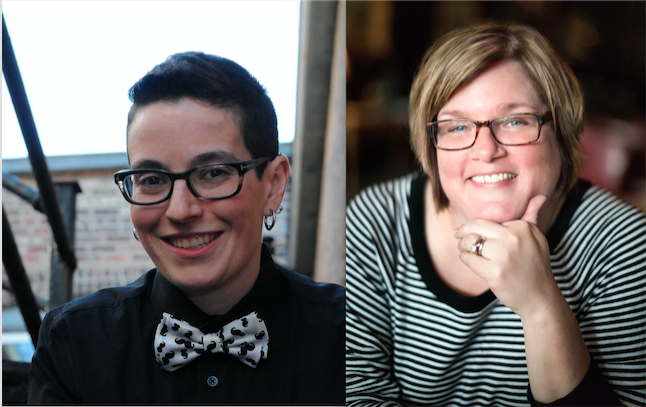In his introduction to Chicago Noir: The Classics, Joe Meno speculates on why Chicago crime has captured the popular imagination—on the news and in various forms of entertainment—since the days of Prohibition: “Chicago is the closest metropolis to the mythical city of shadows first described in the work of Chandler, Hammett, and Cain.” Clearly, there’s nothing entertaining about the city’s real-life violence, but it’s impossible to ignore Chicago's starring role in America’s best crime fiction—from Native Son to The Man With the Golden Arm.
To celebrate that legacy, more than 200 fans of crime fiction, mystery novels, and thrillers will gather in at Roosevelt University’s Loop campus this Saturday for the second annual Murder and Mayhem in Chicago. Three dozen authors, editors, real-life crime reporters, and forensic scientists will speak in a series of five panels, culminating in an awards ceremony and a keynote conversation between Gone Girl author and Northwestern grad Gillian Flynn and Glen Ellyn native Jeffery Deaver.
In partnership with a sister conference in Milwaukee, the one-day event was founded by two Chicago publishing experts: Lori Rader-Day, the Mary Higgins Clark award-winning mystery author of four novels, including this summer’s Under a Dark Sky, and Dana Kaye, brand expert and owner of Kaye Publicity. I asked them about Chicago’s role in crime fiction—past and present—and what to expect at the festival this weekend
How and why did Murder and Mayhem in Chicago come about?
Dana Kaye: I've been attending mystery conferences since 2004. I had never thought of running one of my own, but when the old Chicago mystery conference shut its doors, I felt compelled to do something about it. I reached out to Lori, who had the experience and contacts needed to pull something like this off. Rather than starting from scratch, we partnered with a highly successful mystery event just 100 miles north. Both events are a single-panel track (so you never have to choose between multiple programs).
Why did Chicago emerge as the preeminent setting for crime fiction?
Lori Rader-Day: I would love to see someone from New York or LA do a spit-take over this question. Chicago is a sort of unofficial capital of the midwest in a way that maybe Minneapolis or St. Louis might have a problem with. But the writers are here, and there's so much about Chicago to write about: real-life crime, the neighborhoods, the diversity and the segregation, the city's criminal past lives. There's something about dark stories in beautiful places that readers respond to, and of course Chicago loves a book about itself.
What three to five "classics" would you recommend for Chicago crime-fiction newbies?
DK: Sara Paretsky—the namesake of our Sara Paretsky Award honoring mysteries set in the midwest—was the first Chicago crime writer I read and a great place for newbies to start. Michael Harvey is a must-read, both his standalones and his Michael Kelly series.
LRD: I would sit you in front of We Have Always Lived in the Castle by Shirley Jackson, Rebecca by Daphne du Maurier, The Thin Man by Dashiell Hammett, The Moving Finger by Agatha Christie, Murder Must Advertise by Dorothy L. Sayers, and The Daughter of Time by Josephine Tey. Not a single one of them are set in Chicago, though. Try Native Son by Richard Wright, Sara Paretsky's V.I. Warshawski series, and the soon-to-be-classic debut from Danny Gardner, A Negro and an Ofay (he’ll be at the conference this year).
Why did you choose Gillian Flynn and Jeffrey Deaver for this year's keynote?
DK: Flynn is not only a hometown hero, but her novels depict the many facets of the midwest. Deaver is a highly accomplished author with lots of insight. Both authors are friendly and entertaining, but they don't stray away from exploring the dark side of human nature.
LRD: It's really about finding two people who can hold their own with one another and whose experiences won't be exactly the same. I'm almost afraid to get them in the same room. It might offset some delicate balance in the universe we don't fully understand.
How will this year's festival differ from the first? What did you learn last time?
LRD: One of the panels this year features people on the front line of real-life crime: police officers, crime reporters, forensic scientists, forensic artists. I think it's going to be so interesting to hear what they have to say to one another. Last time, we should have learned not to hold a major event downtown on the same day as St. Patrick's Day, but we didn't learn it. We leaned into it.
What do most people misunderstand about crime fiction? About Chicago crime fiction?
DK: I think a lot of readers dismiss genre fiction as "popcorn," a story without substance, and that's a mistake. I read plenty of literature with a capital L at Columbia College, but some of the deepest, most insightful, and engaging stories I've read fall under the crime-fiction genre. Dennis Lehane's Mystic River, Richard Price's Clockers, Jesse Kellerman's Potboiler. Quality crime fiction is about character and conflict, and to me, those are the two things necessary to create a compelling novel
LRD: Crime fiction isn't a monolith. These labels we hear so much about are just marketing terms, trying to help industry people sort out books for library shelves and to help readers find books they'll love. What I think people get wrong about Chicago crime fiction is that it's all Al Capone stuff. That's doing a huge disservice to the contemporary authors writing about Chicago now: Sara Paretsky, Michael Harvey, Michael A. Black, Frances McNamara, Lynne Raimondo, Clare O'Donohue. The next book from Susanna Calkins will be set in Chicago . . . but actually, that might have Capone in it.
GO Roosevelt University. $35-$65. 9:15 a.m.-5 p.m. eventbrite.com




